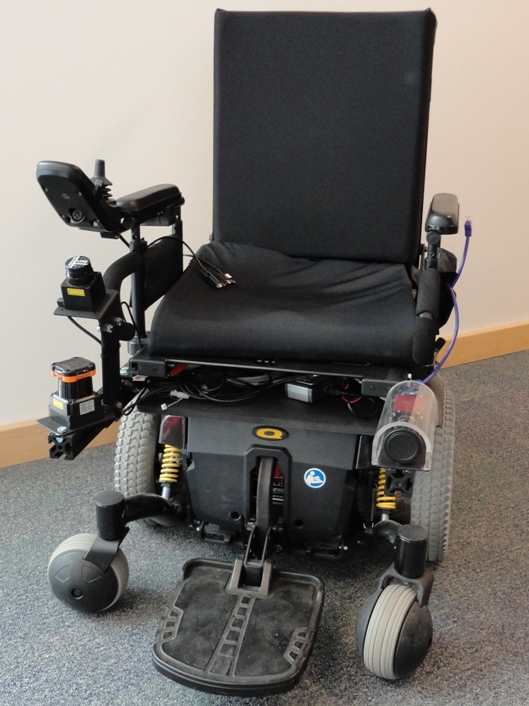Jong Jin Park ( 박종진 )
Applied Scientist
Amazon Lab126
My research is in the area of intelligent robot locomotion. I want to achieve human-level decision making and motion generation in robotic systems.
Contact
Email: jongpark at amazon dot comjongjinp at umich dot edu
Research
I work as a applied scientist at Amazon Lab126. Prior to joining Amazon Lab126, I was with Amazon Robotics, and also worked with Professor Benjamin Kuipers in the Intelligent Robotics Lab at the University of Michigan.I work on intelligent robot locomotion. My current focus is on autonomous navigation. During my Ph.D., I worked on planning and decision-making algorithms for a passenger-carrying mobile robot, with specific application to an electric powered wheelchair navigating autonomously in indoor environments in the presence of pedestrians.
We want our robot to navigate safely and comfortably, but also confidently and efficiently in dynamic and uncertain environments while respecting the preferences of the user. This requires synthesis of nonlinear model predictive control, probabilistic decision making, robust optimization, and human-robot interaction modeling. Also, to make a robot work in real life, good debugging practice based on real data is essential.
Nonlinear control theory and C++ are my primary tools. Recently, I have started delving into deep convolutional neural net for learning non-linear dynamics. I have degrees in mechanical engineering (PhD, MSE), physics (BS), and biology (BS).
Previous Project at Michigan
Graceful Control and Navigation for an Intelligent Wheelchair
 An intelligent wheelchair capable of autonomous navigation could vastly
improve the quality of life and safety of hundreds of thousands of human users.
At the same time, an electric powered wheelchair is a great platform for
autonomous navigation research, as it is one of the smallest platform
that can carry a person, have enough size and power to mount various sensors,
and can operate indoors. It is also relatively easy to maintain.
An intelligent wheelchair capable of autonomous navigation could vastly
improve the quality of life and safety of hundreds of thousands of human users.
At the same time, an electric powered wheelchair is a great platform for
autonomous navigation research, as it is one of the smallest platform
that can carry a person, have enough size and power to mount various sensors,
and can operate indoors. It is also relatively easy to maintain.
I have developed the stochastic model predictive control for our robotic wheelchair, Vulcan. It identifies the current situation with available sensors, predict what is going to happen in the near future, decide and execute the best action to take at each time step. Probabilistic reasoning is essential, since real environments are inherently dynamic and uncertain due to the presence of pedestrians. Here are videos of our wheelchair robot:
The engineering contributions of this research are robust planning and control algorithms for a fully autonomous wheelchair robot that can navigate safely and gracefully in the presence of pedestrians. The long-term scientific contribution I want to make is a deeper understanding of the principles of safe, efficient, and intelligent locomotion.
Publications
Dissertation
-
Jong Jin Park, "Graceful Navigation for Mobile Robots in Dynamic and Uncertain Environments,"
[pdf] Doctoral Dissertation, The University of Michigan -- Ann Arbor, 2016.
Refereed Conferences and Workshops
-
Jong Jin Park, Seungwon Lee, and Benjamin Kuipers, "Discrete-time Dynamic Modeling and Calibration of Differential-Drive Mobile Robots with Friction,"
[pdf] 2017 IEEE International Conference on Robotics and Automation (ICRA-17), 2017. -
Jong Jin Park and Benjamin Kuipers, "Feedback Motion Planning via Non-holonomic RRT* for Mobile Robots,"
[pdf] 2015 IEEE/RSJ International Conference on Intelligent Robots and Systems (IROS-15), 2015. -
Jong Jin Park and Benjamin Kuipers, "Stability Guaranteed MPC for Mobile Robot Navigation,"
[pdf] ICRA 2015 Workshop on Optimal Robot Motion Planning , 2015. -
Paul Foster, Zhenghong Sun, Jong Jin Park and Benjamin Kuipers, "VisAGGE: Visible angle grid for glass environments,"
[pdf] 2013 IEEE International Conference on Robotics and Automation (ICRA-13), 2013. -
Jong Jin Park and Benjamin Kuipers, "Autonomous Person Pacing and Following with Model Predicitve Equilibirium Control,"
[pdf] 2013 IEEE International Conference on Robotics and Automation (ICRA-13), 2013. -
Jong Jin Park, Collin Johnson and Benjamin Kuipers, "Robot Navigation with MPEPC in Dynamic and Uncertain Environments: From Theory to Practice,"
[pdf] IROS 2012 Workshop on Progress, Challenges and Future Perspectives in Navigation and Manipulation Assistance for Robotic Wheelchairs, 2012. Jong Jin Park, Collin Johnson and Benjamin Kuipers, "Robot Navigation with Model Predictive Equilibrium Point Control,"
[pdf] 2012 IEEE/RSJ International Conference on Intelligent Robots and Systems (IROS-12), 2012.
[slides] Note: The slides give an overview of the MPEPC-based navigation. Materials are extended from the talks in IROS-2012 and IROS-2012 workshop.-
Jong Jin Park and Benjamin Kuipers, "A Smooth Control Law for Graceful Motion of Differential Wheeled Mobile Robots in 2D Environments,"
[pdf] 2011 IEEE International Conference on Robotics and Automation (ICRA-11), 2011.
Education
Ph.D., Mechanical Engineering, April 2016University of Michigan, Ann Arbor
M.S.E., Systems and Controls, Mechanical Engineering, April 2010
University of Michigan, Ann Arbor
B.S., Physics, August 2008
Seoul National University, Seoul, Republic of Korea
B.S., Biology, August 2008
Seoul National University, Seoul, Republic of Korea
Professional Service
Program Commitee
- PC member of the IEEE Conference on Development and Learning/EpiRob 2012
Reviewer and Sub-reviewer
- IEEE International Conference on Robotics and Automation
- IEEE/RSJ International Conference on Intelligent Robots and Systems
- IEEE Conference on Development and Learning/EpiRob
- IEEE Transactions on Robotics
- Journal of Intelligent & Robotic Systems
Miscellany
Citizenship: Republic of Korea (South Korea)Erdös Number: At most 4 (Jong Jin Park -- Benjamin Kuipers (Erdos number 3))